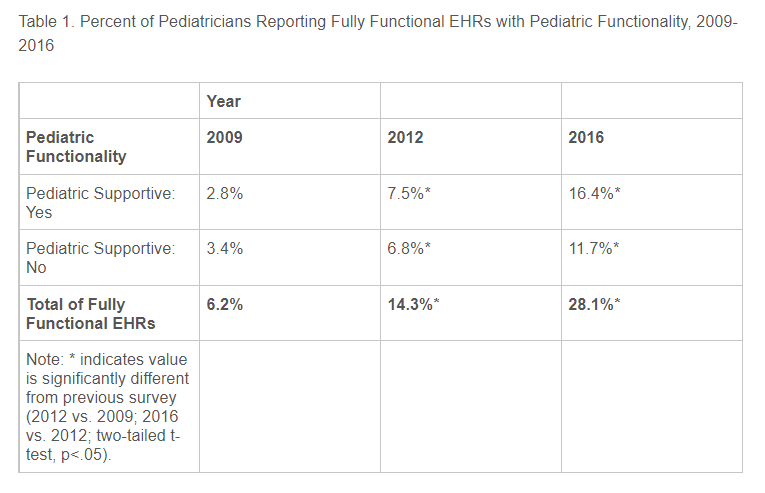Blake Sisk1, Eric Kirkendall4, Lisa Krams1, Joseph H. Schneider2, Christoph U. Lehmann3.
1American Academy of Pediatrics, Elk Grove Village, IL; 2Pediatrics, University of Texas Southwestern Medical Center, Dallas, TX; 3Biomedical Informatics & Pediatrics, Vanderbilt University, Nashville, TN; 4Pediatrics, Cincinnati Children's Hospital Medical Center, Cincinnati, OH.
Presented at the 2017 Pediatric Academic Societies Annual Meeting.
Background: While Electronic Health Record (EHR) adoption has increased, previous studies showed that overall EHR adoption by pediatricians has lagged behind national rates. Further, little is known about pediatricians' perception of the impact and barriers related to EHRs.
Objective: To examine adoption of EHRs by pediatricians from 2009-2016 and determine their attitudes towards EHRs.
Methods: Data from national Periodic Surveys of office-based pediatrician members of the American Academy of Pediatrics in 2009 (N=641, response rate=57%), 2012 (N=580, 54%), and 2016 (N=426, 44%) were analyzed. Participants were non-trainees who provided direct patient care. Surveys collected information on EHR adoption, the EHR's capabilities/features (used to categorize the EHR according to its functionality as Basic, Fully Functional, and/or Pediatric Supportive), barriers to adoption, and perceptions of a positive impact by the EHR. Chi-square and t- tests assessed the statistical significance of descriptive differences and a multivariable logistic regression model (2012 and 2016 only) predicted reporting at least one "major positive impact" due to EHR adoption (predictors: gender, age, practice area, setting, EHR type, survey year, and years with EHR).
Results: Pediatricians reporting the presence of an EHR at their main practice site increased from 60% in 2009 to 94% in 2016 (p<.05). More than 25% of pediatricians in 2016 reported using a Fully Functional EHR, and 16% reported using an EHR that was both Fully Functional and Pediatric Supportive (Table 1). There were no substantial differences in how pediatricians perceived the barriers to EHR adoption across EHR type. Conversely, 67% of pediatricians using Fully Functional EHRs reported that the EHR had a "major positive impact" on their practice, compared to only 58% with Basic EHRs and 53% with non-Basic, non-Fully Functional EHRs (p<.05). Logistic regression results indicate that those with Fully Functional EHRs (AOR 1.59, 95% CI 1.02-2.47) and in practices with EHRs for five or more years (AOR 1.44, 95% CI 1.04-1.99) were more likely to report at least one "major positive impact" from EHR use.
Discussion: Adoption and use of EHRs among office-based pediatricians has steadily increased from 2009-2016 to 94%. The functionalities of implemented EHRs had a significant effect on pediatricians reporting a positive impact, highlighting the importance of the pediatric certification requirement passed in the 21st Century Cures Act.

Last Updated
10/18/2021
Source
American Academy of Pediatrics